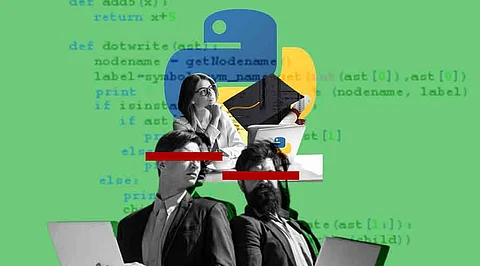
- Insights
- Cryptocurrencies
- Stocks
- White Papers
- Industry
- Geography
- Insights
- Cryptocurrencies
- Stocks
- White Papers
- Industry
- Geography


Python has grown in popularity as a programming language due to its ease of use and versatility. Its applications span across web development, data analysis, artificial intelligence, and more. If you're interested in becoming a Python developer, this comprehensive guide will help you embark on your journey towards mastering this language.
Before diving into Python development, you need to understand the fundamentals. Start by installing Python on your computer. The most recent version is available for download from the Python website. Begin with simple Python scripts, and learn about variables, data types, control structures, and basic functions.
To become a proficient Python developer, you should have a solid grasp of data structures and algorithms. This knowledge is crucial for optimizing your code and solving complex problems efficiently. Study common data structures like lists, dictionaries, and sets, and work on sorting and searching algorithms.
Python is an object-oriented programming language, so understanding OOP concepts is essential. Learn about classes, inheritance, objects, encapsulation, and polymorphism. Practice implementing these principles in your Python code to create clean and efficient solutions.
Python has a rich ecosystem of libraries and frameworks that can save you time and effort. Depending on your interests, delve into libraries like NumPy and Pandas for data manipulation, Django or Flask for web development, and TensorFlow or PyTorch for machine learning and artificial intelligence projects.
The best way to learn Python is by working on real projects. Begin with easy challenges and work your way up to more difficult ones. Whether it's building a basic web application, automating tasks with scripts, or creating data analysis tools, practical experience is invaluable.
Git is an essential tool for tracking changes in your code and collaborating with others. Learn how to use Git and platforms like GitHub or GitLab to manage your Python projects effectively.
Most applications require data storage, and Python offers numerous libraries for interacting with databases. Learn SQL and explore database libraries like SQLAlchemy, SQLite, and PostgreSQL for effective data management.
If you're interested in web development, understanding networking and security is important. Learn about HTTP protocols, network requests, and security best practices to ensure the safety of your applications.
Python is an evolving language with a vibrant community. Stay updated with the latest developments by following Python-related blogs, attending conferences, and participating in online forums.
Contributing to open-source projects is an excellent way to gain experience and improve your coding skills. It also allows you to collaborate with experienced developers and give back to the community.
Create a portfolio showcasing your projects and contributions. This portfolio will be essential when applying for Python developer positions, as it demonstrates your skills and experience to potential employers.
Once you've developed a strong foundation in Python and built a portfolio, start searching for job opportunities. Attend networking events and connect with professionals in the field to expand your job prospects.
Prepare for technical interviews by practising coding challenges, data structure problems, and algorithm questions. Online platforms like LeetCode, HackerRank, and CodeSignal offer a variety of coding exercises to hone your skills.
Technology evolves rapidly, so it's important to stay informed about industry trends, emerging Python libraries, and best practices. Continuous learning will assist you in remaining competitive in the work market.
Becoming a Python developer is an exciting journey that offers a wide range of career opportunities. By following this comprehensive guide, you can develop the skills and knowledge needed to excel in Python development and pursue a fulfilling career in this dynamic field.
